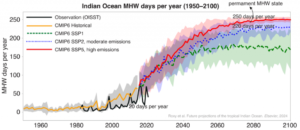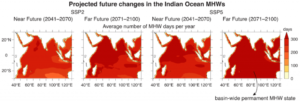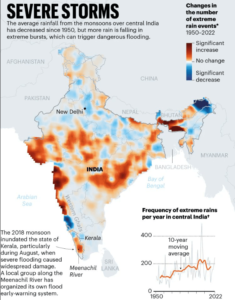Indian Ocean Warming Picks Up Pace: A Study Says
A recently published study in the journal Science Direct has found that the Indian Ocean is warming at an accelerated and unprecedented rate of 1.7–3.8 degrees per century.
The study published by Dr. Roxy Mathew Koll, a climate scientist at the Indian Institute of Tropical Meteorology (IITM), stated that marine heatwaves (periods of unusually high ocean temperatures) are set to increase from 20 days per year (during 1970–2000) to 220-250 days per year.
This high difference in new figures reflects the worsening signs of accelerating anthropogenic climate change, which have now reached criticality. If left unchecked, the warming of the Indian Ocean will wreak havoc on marine diversity.


Permanent changes in the current oceanographic conditions will essentially lead to the mass extinction of species on an unprecedented scale, never seen before, the scientist warned.
Dr. Koll stated that the heat absorbed on the surface has been distributed as far as 2,000 metres below the ocean, is currently increasing at a rate of 4.5 zettajoules per decade, and is likely to reach levels of 16–22 zettajoules per decade in the future. The high ocean heat will also result in a rise in sea levels due to a higher thermal expansion ratio.
He said, “The future increase in heat content is equivalent to adding the energy of one Hiroshima atomic bomb detonation every second, all day, every day, for a decade.”
What does the future Indian Ocean look like?
1/ The warming in the Indian Ocean was strongest during the last seven decades, at a rate of 1.2°C per century.
This is dwarfed by the projected warming of 3.8°C per century in the future, if emissions continue at the current rate. pic.twitter.com/9w9VK0l6mG
— Roxy Koll ⛈ (@RockSea) April 28, 2024
The current trend in warming suggests that by the end of the 21st century, the Indian Ocean is set to plunge into a state of permanent heatwave unless global CO2 and greenhouse gas (GHG) emissions are not reduced immediately. He called for immediate action to stop the acceleration of anthropogenic climate change before we miss the “critical threshold.”.
The researcher said the Indian Oceans maximum basin-average temperature, which ranges from 26 °C to 28 °C every year since 1980–2020, will become 28.5 °C to 30.7 °C year-round if the current global emission of GHG’s persists.
Marine heatwaves (MHW) lead to severe biodiversity disasters like coral bleaching, kelp forest degradation, seagrass loss, etc., and result in long-term impacts on oceanographic and biological conditions in the areas. In essence, of all the heat generated by human activity since the 1970’s, the oceans have absorbed 90% and now have reached criticality.
Climate scientists worry about current warming
Climate scientists have raised grave concerns about the potential implications of the current Indian Ocean warming trends, like more extreme and frequent oceanic cyclones, the loss of south-westerly monsoons, and an increase in ocean activity (8.1 to below 7.7 by the end of the century).

Dr. Koll said, “The pH change may be easier to fathom when we realise that a 0.1 fall in human blood pH can result in rather profound health consequences and multiple-organ failure.”
The change in ocean pH will particularly impact corals and other micro-organisms that require calcification to grow, but the substantial changes spelled by the change will also echo through the millions of creatures inhabiting the Indian Ocean.
⛔️ ⛔️ ⛔️
Indian Ocean headed for a ‘near-permanent’ state of marine #heatwave; cyclones set to intensify, costal population & fishing communities at risk. My story in @MongabayIndia @RockSea @iitmpune @rajeevan61 @Indiametdept @moesgoi @UNFCCC https://t.co/ApWjxJhAWT
— Nidhi Jamwal (@JamwalNidhi) April 29, 2024
Since the 1950s, natural disasters such as typhoons, hurricanes, and tornadoes have become more common and are expected to increase further, spelling extreme socio-economic impact for coastal communities in the 40 countries bordering the Indian Ocean.
The changes in weather patterns and the loss of marine habitat due to prolonged marine heatwaves will devastate fisheries across the globe and may impact the global food market in the long run.

A co-author of the recent study, Thomas Frölicher, who is also a climate scientist at the University of Bern, Switzerland, has said, “The Indian Ocean, a climate change hotspot, faces rapid and strong increases in marine heatwave frequency and intensity unless global CO2 emissions are substantially cut.”
A study suggests the time to act is now
In light of the increased rate of the Indian Ocean’s warming, climate scientists have called for a faster reduction in GHG emissions and urged international organisations, both government and non-profit, to engage in greater collaboration to tackle exacerbating climate change.
The need for the promotion of sustainable existence for humans is essential to preserving marine environments for the millions of other species besides us who call this planet home.











